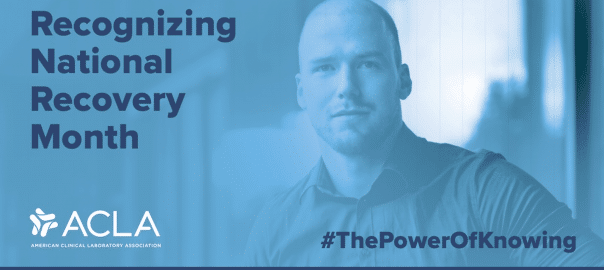All posts by cplatt@reservoircg.com
Appendix to ACLA Response to Draft Local Coverage Determinations, Genetic Testing for Oncology
Letter from Leading Cancer-Related Provider Groups and Patient Advocates on Genetic Testing for Oncology

Understanding the Role of Clinical Laboratories in Supporting Substance Abuse Recovery
September 7, 2023 update: Based on discussions with ACLA and other key stakeholders, CMS has made the decision to withdraw the policy change referenced in the below post. ACLA is gratified that CMS has heard the concerns about the negative impact the edit would have had on patients’ access to medically necessary presumptive and definitive drug testing.
Each September, National Recovery Month is an opportunity to highlight the vital role of clinical laboratories in the treatment and support of people in recovery from substance use disorders. Joan Kegerize, Vice President of Reimbursement and Scientific Affairs with the American Clinical Laboratory Association, offers insight on current issues affecting drug testing and clinical laboratories.
- What is the role of clinical laboratories in treatment of addiction and aiding recovery?
Clinicians rely on drug testing to identify, diagnose, and guide treatment and support people in recovery or those at risk for substance use disorder. Testing is a critical first step in identifying a substance use issue and plays a central role in managing treatment and recovery. - What types of testing are used for these purposes?
There are several types of clinical laboratory drug tests. Most often tests are based on urinalysis, but tests can also be conducted on samples of blood and saliva. - What is the difference between presumptive and definitive testing? For which drugs or drug classes are each of these testing types appropriate?
Presumptive drug tests are used to detect the presence or absence of a drug or a class of drug in a urine sample. Definitive drug testing identities specific drugs and their quantities within a specimen, including drugs that cannot be identified by presumptive methods, such as xylazine and fentanyl analogues. Both presumptive and definitive testing are important to monitoring, managing patient care, and ensuring patient health and safety. - The Office of National Drug Control Policy (ONDCP) recently designated as an emerging drug threat the narcotic fentanyl mixed with xylazine, an animal tranquilizer. The office developed a response plan, the Fentanyl Adulterated or Associate with Xylazine Response Plan, which recognizes the importance of laboratory testing to provide information on this emerging threat. How serious is this drug combination and how do clinical laboratories further the goals of this plan?
ACLA commended the Administration’s issuance of a public safety alert,1 warning of the “widespread threat’’ of xylazine combined with fentanyl, which increases the risk of fatal drug poisoning. Identifying this threat as a national health risk will help reduce the ongoing negative impact that this substance combination has on the current overdose crisis and should aid in reducing unnecessary deaths. In its response plan developed to address the fentanyl-xylazine threat, the ONDCP noted the importance of testing as an essential part of managing the drug abuse crisis. Clinical laboratories have developed tests for fentanyl, xylazine, and many other illicitly manufactured compounds now in circulation. These tests can and should be employed to assist with early identification of use of these substances, as early detection is key to appropriate treatment and reduction of the risk of overdose. - The Centers for Medicare & Medicaid Services (CMS) issued a policy recently that complicates payment to clinical laboratories for both presumptive and definitive drug testing performed for Medicare and Medicaid patients on the same day. What is the rationale behind this policy?
CMS’s stated reason for the policy is that the two types of testing are “mutually exclusive procedures,’’ but the policy fails to account for circumstances in which it is clinically appropriate and necessary for a laboratory to perform both presumptive testing and definitive testing on the same day. For instance, a clinician may suspect that a patient is using cocaine and/or fentanyl. The clinician may order a presumptive test for cocaine and a definitive test for fentanyl, for which there is no presumptive test available. Many community health care providers who treat those with substance use disorders are not equipped to perform on-site testing and they rely on a clinical laboratory to perform both presumptive and definitive testing, when appropriate, for their patients. - How does the new CMS payment policy thwart the goals of the new ONDCP policy? Are there circumstances where labs may have to forego drug tests ordered by doctors? How would the inability to conduct these tests affect patients who seek testing and treatment for substance abuse disorders?
CMS’s new National Correct Coding Initiative drug testing policy, which went into effect July 1, 2023, prevents payment to clinical laboratories for both presumptive drug testing and definitive drug testing performed on the same day for an individual beneficiary of Medicare or Medicaid. It means a patient may need to make two separate visits on different days for the two clinical laboratory tests to be covered by CMS. While CMS has offered to put a generic edit “modifier’’ in place on or after October 1 to allow payment for both presumptive and definite testing in “circumstances when billing these codes together is allowable,’’ ACLA firmly believes that withdrawal of the underlying policy is essential to patient access. This approach begins with a presumption that it is not proper to perform presumptive and definitive testing on the same day, when oftentimes it is reasonable and medically necessary to perform both tests for the management and treatment of a beneficiary. Furthermore, the policy conflicts with the American Medicare Association uniform coding guidance for presumptive and definitive drug testing, and the standard of patient care in drug testing. - Will people with private insurance be able to get around this CMS policy and be able to receive both types of tests during a single visit to a laboratory?
This will not only impact Medicaid and Medicare patients. We are already seeing that the policy is being picked-up by commercial payers, so even patients with private insurance could be subject to the same policy. - What impact could the policy have on patients in recovery?
The ONDCP response plan calls for increased testing as a core component of a robust response to the national threat posed by fentanyl adulterated or associated with xylazine. But this new CMS policy undoubtedly will result in less testing available in the communities that desperately need it. Simply put, this policy will reduce patient access to medically necessary testing to treat substance use disorders. To make testing more available in community settings where it is needed, ACLA is urging the ONDCP, in its upcoming, statutorily required guidance to CMS on the implementation of the response plan, to withdraw the coding policy on non-payment for both presumptive and definitive substance abuse testing, and to provide retroactive reimbursement for any claims that were denied under the policy beginning July 1.
1 https://www.dea.gov/alert/dea-reports-widespread-threat-fentanyl-mixed-xylazine

ACLA Launches “Power of Knowing Campaign” Focused on the Foundational Role of Laboratory Tests in Health Care Decisions

The American Clinical Laboratory Association (ACLA) has launched a new series of digital advertisements inside the Beltway to raise awareness among policymakers of the critical role clinical laboratories serve in America’s health care system. The campaign, called “The Power of Knowing,” highlights how clinical laboratory tests performed and analyzed by dedicated laboratory professionals are foundational to a patient’s health care journey.
With diagnostic test results informing 70 percent of health care decisions, clinical laboratories serve a vital role in the American health care continuum. From prevention to diagnosis and disease management, laboratory tests help guide health care providers in setting patients’ individual care plans, fostering more personalized approaches to care and empowering patients with the information they need to make decisions about their health. Advancements in laboratory testing allow clinicians to diagnose diseases earlier and with more precision – and more innovations are underway. For example, using blood samples, liquid biopsy tests have the potential to help identify multiple cancers at an early stage, which could lead to earlier and more targeted treatments. Liquid biopsies, less invasive and more easily repeated than traditional tissue biopsies, are already allowing clinicians to monitor treatment and better understand changes to a patient’s cancer diagnosis over time.
Every day, routine tests help to reduce costs while expediting care delivery – all while improving patient outcomes. Routine tests, such as the A1c test, the complete blood count (CBC), and comprehensive metabolic panels, help patients manage their health and clinicians deliver more personalized treatment plans, slowing the progression of disease, reducing costs, and improving and saving lives.
ACLA urges policymakers to recognize the critical role of clinical laboratories in America’s health care system and advance policies that strengthen and protect the industry, including the Saving Access to Laboratory Services Act. If enacted, this bipartisan, bicameral legislation would help protect patient access to essential laboratory services, support innovation, and bolster our nation’s laboratory infrastructure, all under threat by Medicare reimbursement cuts in January 2023. Learn more about ACLA’s “Stop Lab Cuts” campaign here.
To learn more about the impact that clinical laboratories have on America’s health care system, click here.